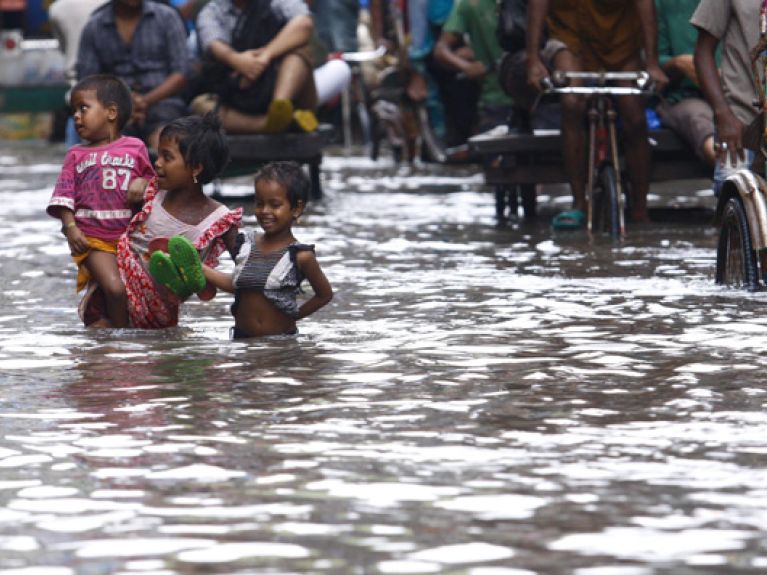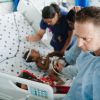An alliance for humanity
Humanitarian aid saves many human lives. One of the key actors is the EU.

For three years, violence and despair have characterised the everyday lives of countless people in Syria. According to the United Nations (UN), the civil war has already cost more than 191,000 people their lives. Numerous houses, schools and hospitals have been destroyed, and for many Syrians there appears to be only one way out, namely to leave their homeland. At the end of September 2014, the UN Refugee Agency claimed that there were more than three million Syrian refugees, while the Office for the Coordination of Humanitarian Affairs (OCHA) counted 6.5 million displaced persons – making this the most severe refugee crisis for many years. Worldwide, the number of people fleeing from their homes rose to 51.2 million in 2013 – the highest number recorded since the Second World War.
In many cases, help from abroad is their last hope. In 2013, the world’s leading donor of humanitarian aid funding was the European Union (EU), which contributed more than 1.3 billion euros. If the aid donated by its member states is added to this figure, it accounts for half of the total sum raised worldwide for humanitarian aid. In Syria, for instance, the EU made 350 million euros available in addition to the funding donated in previous years, as well as supporting neighbouring states which have taken in refugees by providing them with humanitarian aid such as ambulances, heaters and hygiene products. In total, Europe has made more than 2.8 billion euros available since the start of the civil war.
Numerous other conflicts and disasters keep the world on tenterhooks time and time again – and virtually everywhere the European Union tries to help regardless of whether the humanitarian crisis came about as a result of war or natural disaster. The central focus of the aid is always on the people affected. The lion’s share of the EU’s humanitarian aid budget is spent on food aid – people are provided with food, money, food vouchers, seeds and fertilisers. Additional support is provided in the form of accommodation, clean drinking water, medical care and sanitary facilities.
The EU does not take direct action itself, however, but supports some 200 partners which provide assistance in the countries in question – such as the United Nations (UN), non-governmental organisations or associations such as the International Committee of the Red Cross or the International Federation of Red Cross and Red Crescent Societies. The EU’s aid activities are coordinated by the Directorate-General for Humanitarian Aid and Civil Protection, or ECHO for short. “Since 2010, both these areas have been handled by one organisation; the merger makes coordinating the aid much more efficient,” explains Kim Eling from Germany, who is Deputy Head of Cabinet in the EU’s Department of Humanitarian Aid and Crisis Response. In all, 811 people work in the Directorate-General for Humanitarian Aid and Civil Protection, 460 of them employed in a total of 44 offices abroad. Among other things, they monitor the projects financed by the European Union, while the remaining employees provide assistance and support from their base in Brussels.
Saving human lives and relieving suffering are the goals of both humanitarian aid and civil protection. “Humanitarian aid is deployed above all in non-EU states and provides independent organisations with financial assistance,” explains Eling, while civil protection also offers immediate relief within the EU. In its activities it also falls back on national relief organisations such as Germany’s Federal Agency for Technical Relief (THW). Almost all of the THW’s 80,000 relief workers are volunteers – and provide a great deal of help, donating 1.9 million hours of their time in 2013. The volunteers can achieve the most when they work together with other organisations, which is how the idea of coordinating relief programmes within the EU arose in 1991 – a year in which the world was kept in suspense by numerous humanitarian crises in countries such as Afghanistan, Burma, Ruanda, Sri Lanka and Sudan. The then twelve member states resolved to intensify their cooperation. In 1992, the year in which ECHO was established, the organisation was already able to demonstrate just what it was capable of: the war in the former Yugoslavia had left hundreds of thousands of people starving, traumatised and displaced. The EU sent, among other things, 300,000 tonnes of food, blankets, mattresses and toiletries to the country. Never before had an international organisation staged such a large-scale humanitarian aid operation in a single region.
Besides such coordinated relief, all EU states run their own programmes. Since 2012, the Federal Foreign Office in Germany has been in charge of all humanitarian aid provided by the Federal Government abroad – previously, responsibility in certain areas still lay with the Federal Ministry for Economic Cooperation and Development (BMZ). Much in the same way as the European Union, the Federal Foreign Office also supports aid projects – more than 358 million euros was spent on aid in 2013. The UN coordinates the individual programmes of the member states, the activities of ECHO and all other global aid programmes. “While the humanitarian measures undertaken by the EU and its members remain visible, they are incorporated into a global campaign,” explains Kim Eling. Furthermore, all aid organisations have undertaken to observe the four humanitarian principles of neutrality, humanity, independence and impartiality. The importance of these principles is growing, as more and more help is needed: in 2014, the EU has calculated that the highest ever figure will be needed worldwide, namely 13 billion euros.
More demand for aid also means that more work needs to be done, which is why the EU is stepping up its involvement of volunteers. In its new “EU Aid Volunteers” initiative, people are being trained as humanitarian aid workers. From 2015, the volunteers will travel to crisis regions all over the world and support relief organisations in their work. Initially the project will run until 2020, by which time the goal is to have trained more than 18,000 EU citizens as voluntary humanitarian relief workers. This is also a way of developing the leaders and managers of tomorrow. ▪

